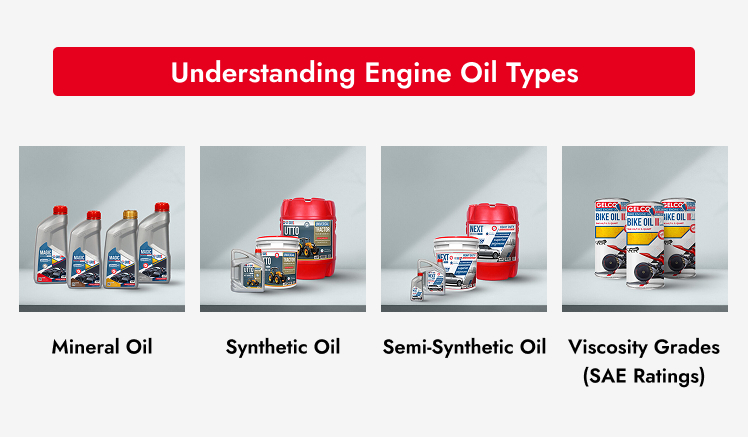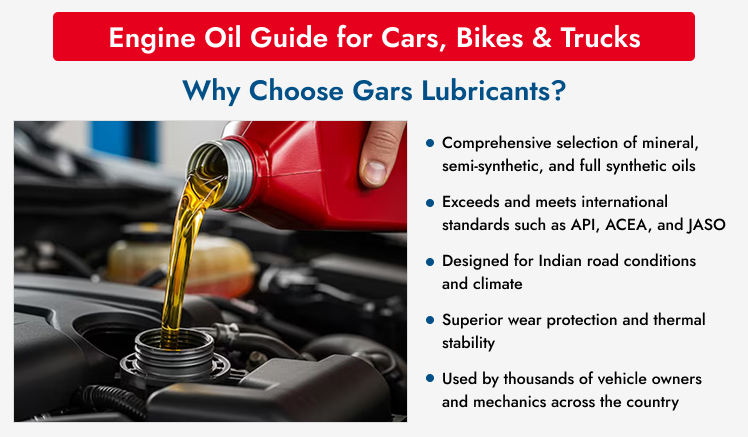Engine Oil For Vehicle: How To Choose The Perfect One For Your Car, Bike, Or Truck

Engine Oil For Vehicle: How To Choose The Perfect One For Your Car, Bike, Or Truck
Engine oil is the lifeblood of your car, whether it's a car, motorbike, or lorry. It keeps moving parts lubricated,
minimizes wear and tear, stops overheating, and ultimately prolongs the life of your engine. Picking the correct Automotive lubricants for your motor
isn't merely about checking off a maintenance to-do list; it's about long-term performance, fuel economy, and
silky-smooth rides. But with so many different types of oil and so many brand names, how can you be sure which one is
right for you?
In this guide, we will simplify all you need to know concerning engine oil for cars, motorbikes, and trucks, combined
with expert advice from Gars Lubricants.

 Whether you're a car enthusiast, a daily cycling commuter, commercial truck driver, Gars Lubricants has the ideal
solution to maintain your engine at its peak performance.
Whether you're a car enthusiast, a daily cycling commuter, commercial truck driver, Gars Lubricants has the ideal
solution to maintain your engine at its peak performance.
Watch out for these signs that it's time to change the oil:
Understanding Engine Oil Types
When choosing the best engine oil, it's crucial to familiarize yourself with the types. Engine oils are broadly categorized as:
1. Mineral Oil:
Produced from processing crude oil, mineral oils are cheaper but provide less protection for extreme temperatures. Ideal for low or older performance engines.2. Synthetic Oil:
Synthetic engine oil is specially formulated chemically for maximum performance. They provide superior resistance to temperature, better lubrication, and longer oil change intervals.3. Semi-Synthetic Oil:
A mixture of mineral and synthetic oils—ideal for moderate performance, better protection than mineral, without full synthetic cost.4. Viscosity Grades (SAE Ratings):
These (such as 10W-30 or 5W-40) define oil flow at various temperatures. Always check your owner's manual or seek advice from a professional to choose the appropriate viscosity for your area and vehicle.Choosing the Right Engine Oil for Cars
Cars generally require oil that provides fuel efficiency and guards the engine. The ideal engine oil for a car is subject to:- Engine type: Turbocharged or naturally aspirated?
- Age of the car: Older engines will require thicker oil.
- Driving conditions: Do you drive in hot, dry, and dusty or cold, snowy weather?
- 5W-30 or 10W-30 for most newer petrol and diesel cars
- 0W-40 for high-performance engines
Choosing the Right Engine Oil for Bikes
Motorcycles run at higher RPMs than automobiles, so they require engine oil for bike that offers better heat protection and shear stability.- Important Considerations: Two-stroke or four-stroke engine
- Air-cooled or liquid-cooled engine
- Riding style: City commuting or touring?
- 10W-40 or 20W-50 in most four-stroke engines
- Special 2T oils for two-stroke engines
Choosing the Right Engine Oil for Trucks
Trucks, particularly commercial trucks, carry heavy loads and operate for extended hours. Engine oil selection becomes essential to optimize fuel economy and engine life.- Important Considerations: Diesel engine load and torque
- Protection against high mileage
- Long drain intervals
- Suggested Grades for Trucks: 15W-40 or 20W-50 heavy-duty diesel engine oils
- Select oils that are API CI-4 / CJ-4 rated
Gars Lubricants Recommended Engine Oil Guide for Cars, Bikes & Trucks
There is no one-fits-all engine oil for vehicles. Each vehicle has different requirements depending on its engine type, age, and operating conditions. Whether you're a car enthusiast, a daily cycling commuter, commercial truck driver, Gars Lubricants has the ideal
solution to maintain your engine at its peak performance.
Whether you're a car enthusiast, a daily cycling commuter, commercial truck driver, Gars Lubricants has the ideal
solution to maintain your engine at its peak performance.
Checklist For How to Choose the Right Engine Oil For a Vehicle
Here is a simple checklist to assist you in selecting the best engine oil for your vehicle:- Look at the owner's manual for the suggested viscosity grade
- Consider your local climate and average driving distance
- Choose between mineral, semi-synthetic, or synthetic based on usage
- Look for certifications (API, ACEA, JASO)
- For high-mileage vehicles, consider high-mileage formulas
- When in doubt, consult Gars Lubricants experts or local mechanics
When to Change Your Vehicle’s Engine Oil
| Vehicle Type | Oil Type | Recommended Change Interval |
|---|---|---|
| Bikes | Mineral Engine Oil | Every 3,000 – 5,000 km or every 6 months |
| Cars | Semi-Synthetic Engine Oil | Every 8,000 – 12,000 km (up to 15,000 km for synthetic oil) or every 4-6 months |
| Trucks | Synthetic Engine Oil | Every 10,000 – 16,000 km depending on usage & load |
| Industrial/ Heavy Machinery | Conventional or Synthetic Oil | Every 100-200 operating hours (conventional), or 300-500 hours (synthetic) |
- Dark, dirty oil
- Engine noise or knocking
- Oil change warning light
- Decreased fuel efficiency
